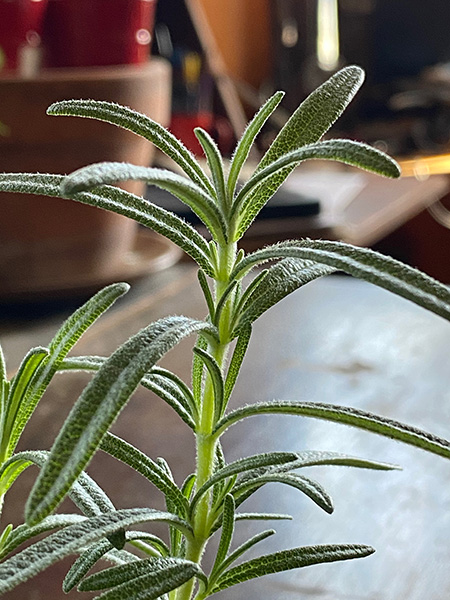When most people think Rosemary, they’re thinking about cooking. The fact is that many ‘kitchen herbs’ also have medicinal value! Exploring culinary herbs is an easy way to learn about medicinal herbs. You can easily find them at your local nursery to start a garden. While I wouldn’t recommend using the dried herbs from the spice section of your grocer, in a pinch, you can use the fresh organic cuttings from the produce section.
Rosemary is a tender evergreen plant that comes to us from Southern Europe. I can grow rosemary in zone 6b, but I sometimes have trouble overwintering it. I find that covering her with plastic and straw or leaves for insulation helps her against the cold. It is heavily perfumed with a fresh, almost pine-like scent and can grow to about 1 meter in height in temperate regions and double that size in warmer regions.
Do you have rosemary in your garden? If not, ask your mom or dad to buy some fresh rosemary from the store to try this experiment. If you have some fresh rosemary, put a leaf in your mouth and chew it with your front teeth. What do you notice? The first thing you’ll probably notice is that your mouth wrinkles and dries out as you chew. Does rosemary make your mouth feel warm, like a chili pepper or a slice of ginger would? Maybe not that hot, but probably warmer than it was. How does that leaf taste? Did you notice anything when you first put it in your mouth? A sharpness? We call that taste sharp. You may also notice its other taste, bitter. Energetically, plantain is pungent, bitter, warming and drying. It is good to think about these aspects when you try to think about what rosemary is useful for.

Nutritionally, rosemary contains many vitamins and minerals: calcium, copper, iron, magnesium, manganese, phosphorus, potassium, sodium, vitamin A, vitamin B1 (thiamine), B2 (riboflavin), B3 (niacin), vitamin C and zinc.
Rosemary also contains many medicinal compounds, including essential oils such as borneol, camphor, cineole, eucalyptol, linalol, pinene, thymol and verbenol, the flavonoids apigenin, diosmin, heterosides and luteolin, quinones, resin, rosmarinic acid, rosemary, tannins and the triterpenes olean acid and ursolic acid.
Medicinally, rosemary is anodyne, antibacterial, antidepressant, antifungal, anti-inflammatory, antimicrobial, antimutagenic, antioxidant, antiseptic, antispasmodic, aromatic, astringent, bitter, cardiotonic, carminative, cephalic, cholagogue, choleretic, circulatory stimulant, diaphoretic, digestive, diuretic, emmenagogue , hypertensive, nervous, ophthalmic, rejuvenating, rubefacient, stimulant and stomachic.

Let’s see how we can work with Rosemary…
Rosemary may be helpful for people with chronic fatigue and forgetfulness. It is said that crushing and inhaling the scent of rosemary can help clear your mind.
As a stimulant, Rosemary is great for stimulating the circulatory and nervous systems. It has a great toning and calming effect on the digestive system, especially when there is psychological tension. Rosemary has also been found useful in epilepsy and dizziness and can help increase height blood pressure. It is valuable in cases of fainting or periods of weakness associated with poor circulation. Drinking a rosemary infusion over a period of time can help with poor circulation.

Externally, it is used to relieve painful sciatica pain, muscle pain and neuralgia. Generally, rosemary is applied as a salve, infused oil, or by mixing its essential oil with a carrier oil such as almond oil. A tincture or liniment can also be used to help with these external problems as well.
Women who have heavy periods or are pregnant should avoid medicinal use of Rosemary as it is known as an emmenagog, which can stimulate menstruation. However, those with normal or light bleeding can benefit from Rosemary’s antispasmodic properties for menstrual cramps.

Rosemary is stimulating for the hair follicles and scalp circulation, making it most likely useful for premature baldness. To benefit from this aspect, a nice infused oil or essential oil diluted in a carrier oil such as almond, apricot kernel or grapeseed oil should be applied daily and massaged into the scalp. Alternatively, a rosemary infusion can be used as a rinse. Rinsing is only recommended for people with darker hair, as it tends to darken a bit and can make lighter hair look dull.
Rosemary contains chemicals called quinones, which have been shown in laboratory studies to inhibit carcinogens, meaning it has the ability to prevent cancer. Another reason to add Rosemary to your daily meals!

